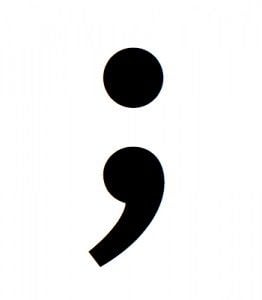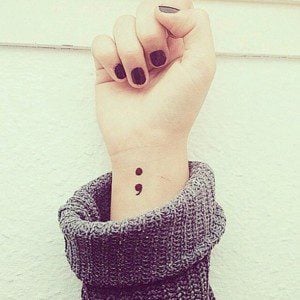 I’ve always felt that the semicolon was a woefully underused bit of punctuation.
I’ve always felt that the semicolon was a woefully underused bit of punctuation.
While other strange symbols on the computer keyboard have come into their own in the Internet age—the ubiquitous “@” sign for e-mail and the “#” on Twitter—the semicolon has still not found a comfortable place in the 21st Century. Because let’s face it: emoticon winks just don’t count.
But now, at long last, there are people putting the semicolon to good use.
Project Semicolon was founded in 2013 by Amy Bleuel of Green Bay, Wis., who lost her father to suicide. He, like 34,000 Americans every year, decided to cut his own story short. In his memory, Bleuel is encouraging Americans to take a different route—and she’s using the semicolon to get her point across, turning it into a symbol of hope and continuation.
“A semicolon is used when an author could’ve chosen to end their sentence, but chose not to,” Project Semicolon’s site says. “The author is you and the sentence is your life.”
I talk a lot about story in this space, and how the stories we see or hear or read or feel can help us learn something about our own stories, and about how they fit with God’s great, all-encompassing epic that He’s been writing since the beginning of time. But sometimes, it’s hard to remember that we’re all part of something that special.
Several years ago, I was diagnosed with depression. Around 14.8 million Americans are estimated to suffer from the condition to one degree or another, though most never get any treatment for it. And even though I’d say my own experience with depression isn’t particularly severe, I understand the attraction of the period.
 The message of Project Semicolon struck a nerve with me. It’s done so for countless others, too. You’re seeing people across the country with semicolons drawn or tattooed on their wrists—reminders to keep writing their stories, and to encourage those around them to keep writing, too.
The message of Project Semicolon struck a nerve with me. It’s done so for countless others, too. You’re seeing people across the country with semicolons drawn or tattooed on their wrists—reminders to keep writing their stories, and to encourage those around them to keep writing, too.
It’s a difficult thing to admit having mental or emotional difficulties. But I think it can be particularly—and paradoxically—hard when you’re a Christian. Our relationship with God is supposed to make all that sadness and discomfort go away, shouldn’t it? So we’re told sometimes. And truthfully, I do think faith can help; it has helped me. But rarely does having faith simply wipe depression away. God doesn’t give us a magic happy pill, as much as we might wish for it sometimes.
So it’s gratifying to know that Project Semicolon is also a faith-based non-profit. It rejects the notion that depression is the sign of a weak or insufficient faith. Instead, it steps in with a message of love and courage and hope. And it’s a reminder that God does heal—but sometimes in unexpected ways. On her website, Bleuel writes:
When the foundation of this project was created those involved reflected on what got them to where they are today. The answer was clear that it was the love of Christ. As we set forth in the project, we committed to loving with a Christ-like love those who are struggling. We inspire others through the very thing that brought us to continuance in our own stories. This by no means excludes any other beliefs or religions, as we accept them all. For we are all in this together. I ask you stick around with us for this journey. We might surprise you in the end with the outcome.
I’ve called this blog Watching God, and for the most part it focuses on the entertainment around us—what lessons He might be teaching us through our movies and music and television shows. But more broadly, I’ve always been fascinated in watching God work in our society—and to watch how people serve as His hands and feet around the world. God isn’t picky about the ways in which He communicates with us. And through Amy Bleuel’s Project Semicolon, maybe He’s speaking to some of us—helping those who desperately need to see His love and purpose—through a tiny punctuation mark.













